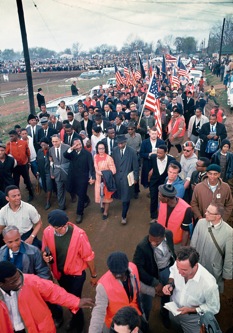
King and other civil-rights leaders enter Montgomery, on a 1965 march inspired by James Bevel (left, in skullcap). Photograph by Matt Herron
The Color of Law in last week's New Yorker covers the US Civil Rights movement. Author Louis Menand captures the scene of the day emotionally, and at times, horrifically.
Particularly fascinating was Dr. Martin Luther King's rise to the leadership and symbolic position he held during the movement. I was surprised to learn that some of Dr. King's peers had skepticism towards him. To some, he was an opportunist.
But the story concludes positively for Dr. King's character.
This excerpt from page 6 sums King's integrity succinctly:
"When he was approached, in 1955, to speak at the first mass meeting of the Montgomery bus boycotters, King was twenty-six years old. He declined. He changed his mind when he was assured that he would not have to take a leadership position. King had less than half an hour to prepare that speech, which he delivered in the Holt Street Baptist Church to an overflow crowd of more than five thousand. It’s a powerful oration—“If we are wrong,” he said, “God Almighty is wrong!”—and he must have sensed, from the frenzied response, that this was work he was intended to do. And it’s all he did. He never thought of running for office. Despite being tempted, cajoled, and baited, he never abandoned his commitment to nonviolence.
The activists in SNCC were not the only ones who thought King was an opportunist. So did Marshall, the man who argued Brown before the Supreme Court. So did J. Edgar Hoover, who tried to convince Kennedy that King was a dupe of the Communists, and who suspended the F.B.I.’s practice of warning political figures of death threats in King’s case.
So, for a time, did Roger Wilkins, an assistant attorney general in Johnson’s Justice Department. Then, in 1966, Wilkins went to see King in Chicago, where, in the face of neo-Nazi violence, King was trying to get the city to address the problems of inner-city poverty. King had rented a walkup in a slum neighborhood. When Wilkins and another Justice Department lawyer got up the stairs, they found King in a small, airless room in a railroad apartment, talking to forty or fifty gang kids. He was holding a seminar on nonviolence. “For hours this went on,” Wilkins later told one of L.B.J.’s biographers. “There were no photographers there, no newsmen. There was no glory in it. He also kept two assistant attorney generals of the United States waiting for hours while he did this.” It was four o’clock in the morning when King finished. He woke Coretta and she made coffee. “We sat and we talked,” Wilkins said. “He was a great man, a great man.”
The Color of Law: Voting rights and the Southern way of life.





















